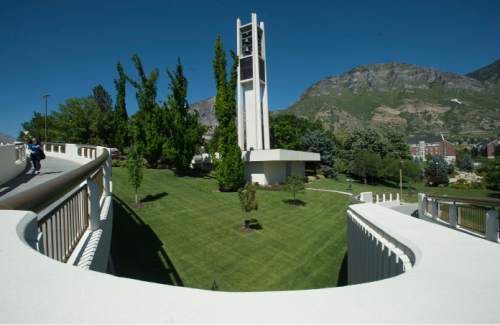This is an archived article that was published on sltrib.com in 2016, and information in the article may be outdated. It is provided only for personal research purposes and may not be reprinted.
Provo • In the three years since the U.S. Supreme Court ruled against the Defense of Marriage Act, religious-freedom laws have been defeated in several states, Tim Schultz, president of the 1st Amendment Partnership, said Thursday.
Beyond evolving public opinion and legal precedent, Schultz said, the defeat of religious-freedom efforts is due in part to a failure of proponents to clearly describe what they're striving to protect.
Many religious conservatives object to people losing housing or jobs, he said, or being denied services because of their sexual orientation.
But in public debate, he said, the rights of lesbian, gay, bisexual and transgender people are seen in opposition to those of religious people and groups, resulting in continued threats to religious liberty.
"If it is successfully defined as a right to discriminate, religious freedom will lose," Schultz said. "The issue has been defined, and not in a way that a religious-freedom supporter would recognize."
Schultz's comments came during a conference at Brigham Young University on the subject of religious freedom.
The conference, sponsored by BYU's International Center for Law and Religion Studies, continues Friday.
Several speakers commented on the divisive efforts of groups lobbying in isolation for greater legal protections for religious Americans or LGBT Americans. The division often creates a stalemate, Schultz said, which leads to continued intervention by the courts and a loss of "legislative bargaining."
"Both sides are going to have to realize that, to get what they want, they're going to have to come together and see compromise," Schultz said.
Thomas Berg, a professor at the University of St. Thomas School of Law, said religious conservatives likely will continue to face pressure to adhere to secular and progressive values.
Practical arguments that respect the views of nonreligious people will be key to preserving religious freedoms, he said, like the option of medical professionals to excuse themselves from abortion procedures or for government employees and religious organizations to object to facilitating same-sex marriages.
"Religious-liberty arguments, to be successful, I think have to take into account the interests of the other side of the dispute," Berg said.
Speakers and audience members at the conference made frequent mention of national cases in which religious individuals had faced lawsuits or fines for refusing to accommodate LGBT people and same-sex marriages.
Brett Scharffs, a BYU law professor, said the most effective strategies are those that lower the volume of contention surrounding the controversies.
"We don't expect the fires to be put out by people whose tools are matches and gasoline," he said.
The military has shown that the United States is capable of accommodating conscientious objection without the country's national security apparatus collapsing, he said.
In a similar way, he said, there is room for people of faith to disagree with other sentiments on marriage, sexuality and secularism with their rights intact.
"It is not true that any opposition to same-sex marriage is, ipso facto, hatred toward gays," Scharffs said.
The conference mostly addressed the preservation of religious rights, but speakers also addressed the need for respect and tolerance between mainstream and minority religions.
Michael Frandsen, public affairs director for The Church of Jesus Christ of Latter-day Saints, which owns and operates BYU, said Mormon leaders have never thought religious freedom should be enjoyed only by some religions.
"Religious freedom is a pretty cheap freedom if it only applies to people or groups that are popular," Frandsen said. "You should assume you won't always like those in power. And you should assume those in power won't always like you."
Imam Muhammad Musri, of the Islamic Society of Central Florida, led a workshop on Americans' religious rights and how they pertain to Islam.
He objected to characterizations of Islam as being an inherently violent religion and the myth that the religion is a political movement bent on imposing Islamic law on the United States.
Perpetrators of mass violence are described commonly as mentally ill, he said, while people with a Muslim background who commit crimes are identified by their religion or labeled as radical Islamic terrorists.
"Associating the word 'Islam' with 'terrorism,' intentionally, is part of the problem," Musri said.
Islam lacks the centralized authority, like the Mormon prophet or Catholic pope, to speak out on official positions or to condemn the actions of individual members of the faith, he said.
And while Muslim leaders react and respond to incidents of violence or terrorism, he said, those statements are not necessarily reaching an American audience.
"That's not being translated to English and shown on CNN," Musri said. "Mainstream media is not interested in hearing our message."
During his workshop, an audience member asked what test could be applied to Muslim immigrants to ensure that they "are not carrying this disease that causes a pandemic problem in America because of [their] zealousness."
Musri responded by saying, like Christianity or Judaism, Islam encourages peace and charity, independent of the actions of individuals.
"Out of a million American Muslims, you may have one bad apple, but the vast majority are law-abiding citizens," Musri said. "The litmus test is to treat people as you wish to be treated."
During Schultz's presentation, another audience member said advocates of same-sex marriage demand tolerance while refusing to tolerate supporters of traditional marriage, and that "the LGBT crowd" had joined with secular humanists and Marxists to achieve their goals.
Schultz drew applause when he disagreed with the man's descriptions, and he said there is room for common ground and understanding among the majority of Americans.
"I do agree that there are extremists on both sides," Schultz said. "But I don't think either side is particularly characterized by extremism."





